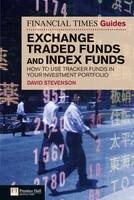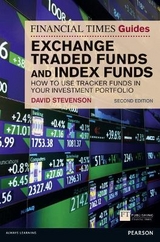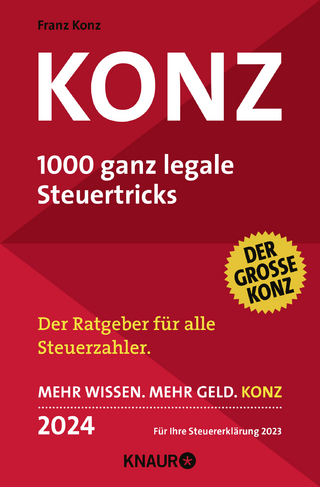
Financial Times Guide to Exchange Traded Funds and Index Funds
Pearson Education Limited (Verlag)
978-0-273-72783-5 (ISBN)
- Titel erscheint in neuer Auflage
- Artikel merken
How can you make ETFs work in your investment portfolio and what are the risks?
Exchange Traded Funds are an investing revolution that have challenged modern investment principles such as individual stock selection and the need to hire a fund manager. By tracking an index, focusing on themes and sectors and helping assess risk they are fast becoming a key investment vehicle.
The Financial Times Guide to Exchange Traded Fundsis a comprehensive and authoritative introduction to this new way of running an investment portfolio. It explains what index tracking funds are, how they work, compares different fund types and provides a coherent investing master plan. Proving that the best investment strategies really are based on easy to understand principles, The Financial Times Guide to Exchange Traded Funds:
· Shows you how to use ETFs, what to watch out for and advises on the very real risks
· Suggests actual portfolios of mixed ETFs for you to start with
· Gives you 25 essential indexes that you should be following
Exchange Traded Funds (EFTs) are a rapidly-growing investment strategy, forcing the traditional mutual funds sector on to the back foot. ETFs are not a complicated idea - its all about tracking the right index, working out the important sectors, improving your international diversification, investigating alternative assets and assessing the risk of the fund and the underlying index.
The Financial Times Guide to Exchange Traded Funds covers:
A Quick Primer on the Theory
Structuring the Revolution
Investing In Commodities Using Index Funds
The Notty Gritty By ETF journalist Paul Amery
The New Fundamental Indexing Revolution by fund manager Rob Davies
On Portfolios by financial planner James Norton
Big Theme Investing And Index Funds by Dr Stephen Barber
Active Portfolios Using ETFs by analysts Tarquin Coe And Mark Glowrey
Putting It All Together
The Master Portfolios
The Essential 25
List of All London Listed Etfs
Major Index Returns
Using index tracking Exchange Traded Funds will change your investing behaviour and change it for the better.
About the authors
David Stevenson is a columnist for the Financial Times Weekend edition, and authors the Adventurous Investor section where he writes about everything from investing in Mongolia through to using ETFs in your portfolio. Hes also a columnist for the Investors Chronicle (based around his SIPP) and before that was a columnist for Citywire. David writes extensively about ETFs for the FT and has developed a series of Master Portfolios that make use of index tracking funds for the Investors Chronicle .
A great author to bring to FTPH/Financial Times Guides, David Stevenson is a columnist for the FT Weekend edition, and writes the Adventurous Investor section where he writes about everything from investing in Mongolia through to using ETFs in your portfolio. He’s also a columnist for the Investors Chronicle (based around his SIPP) and before that was a columnist for Citywire. David writes extensively about ETFs for the IC and the Ft and is currently developing a series of Master Portfolios for the IC. Multitalented, David also runs a media company and has online broadcasts called The Four Wise Monkeys - http://www.4wm.co.uk/ . The strapline for this is ‘Because investing is not just for monkeys’ and brings together David, Stephen Barber from Selftrade and Robbie Burns, one of our key competing authors.
Table of Contents
INTRODUCTION By Matthew Vincent, FT
CHAPTER 1 Investing 2.0 The Revolution Begins
· Decline of the stockpicker and now the decline of active fund manager
· Need to emphasize cost in this low return world
· Investors waking to the reality that they have to diversify especially after bear markets
· The rise of asset class investing, related to but separate from ETfs and index funds
· The rise of the dreaded term beta
CHAPTER 2 A BIT OF THEORY
Where it all came from academically. The academic revolt
The efficient markets theory
The fundamentalists wade in
The first ETF structures and index funds. The legendary John Bogle and the Vanguard Phenomena
CHAPTER 3 WHAT ARE INDEX OR TRACKER FUNDS?
Index mutual funds and how they developed from these into these
Exchange Traded funds, US Style
European ETFs the rise of the swap
ETNs in the US and certificates in Europe
ETCs (commodities) and synthetic ETFs
The mechanics full replication, partial replication, fully synthetic replication
Comparing ETFs vs traditional mutual funds vs index mutual funds
Advantages of different structures and the regulatory structure
New innovations inverse ETFs, multi-ETF portfolios, actively managed ETFs
CHAPTER 4 THE FIDDLY DETAIL
.RISKS, CAVAETS and the INIDICES
What to watch out for premiums/discounts, tax complications, tracking error, charging (some are expensive the 1% rule)
Counter Party Risk
Why the index matters not all indices created equally. Some are too concentrated, carry currency risks, arent very liquid, and some are just pointless
CHAPTER 5 THE RISE OF THE FUNDAMENTALISTS
Guest writer Rob Davies, fund manager of the Munro Fund, a fundamental index fund
The academic theory surrounding fundamental indexing
Does it work ? The results so far
How to implement it via a fund black boxes, dividends and the measures used
Will it work in the future might value investing be dead ?
CHAPTER 6 BIG THEME INVESTING AND INDEX FUNDS
Guest Writer Stephen Barber, Head of Research at Selftrade
Momentum investing works and particularly a focus on big themes, big structural changes
Emerging Markets
Alternative Assets
New Energy and Green markets
Infrastructure and utilities
Commodities
CHAPTER 7 RUNNING A PORTFOLIO : SOME BASICS
Guest Writer James Norton, Head of investment at Evolve Financial Planning
A passive portfolio why it matters vs Active
Buy and Hold
Asset Allocation explained correlation and diversification
Inflation
Income investing
Long Term returns ?
The GlidePath
CHAPTER 8 ACTIVE PORTFOLIOS USING ETFS
Guest Writer Mark Glowrey, Investors Intelligence
How to combine ETFs into an active portfolio using technical analysis
The measures sued
Running the portfolio
CHAPTER 9 PUTTING IT ALL TOGETHER INTO A PORTFOLIO THAT WORKS FOR YOU !
Asset Class Investing
Value vs Growth vs Momentum all work but difficult to capture these strategies
Importance of international diversification
Lazy Portfolios and why theyre so useful
The idea behind building your own MASTER PORTFOLIOS
Lifeycle Investing
Our MASTER PORTFOLIOS the assumptions
ULTRA LOW RISK INCOME portfolio
LOW RISK portfolio
ABSOLUTE RETURNS portfolio
ADVENTUROUS HIGH RISK portfolio
GLOBAL GROWTH portfolio
CHAPTER 10 THE ESSENTIAL TOP 30
Our top 30 funds that should form the building blocks of any portfolio over the long term
BGI data on the growth of the ETF sector and their analysis
Glossary
| Erscheint lt. Verlag | 21.12.2009 |
|---|---|
| Reihe/Serie | The FT Guides |
| Verlagsort | Harlow |
| Sprache | englisch |
| Maße | 234 x 159 mm |
| Gewicht | 790 g |
| Themenwelt | Sachbuch/Ratgeber ► Beruf / Finanzen / Recht / Wirtschaft ► Geld / Bank / Börse |
| Wirtschaft ► Betriebswirtschaft / Management ► Finanzierung | |
| ISBN-10 | 0-273-72783-4 / 0273727834 |
| ISBN-13 | 978-0-273-72783-5 / 9780273727835 |
| Zustand | Neuware |
| Informationen gemäß Produktsicherheitsverordnung (GPSR) | |
| Haben Sie eine Frage zum Produkt? |
aus dem Bereich



